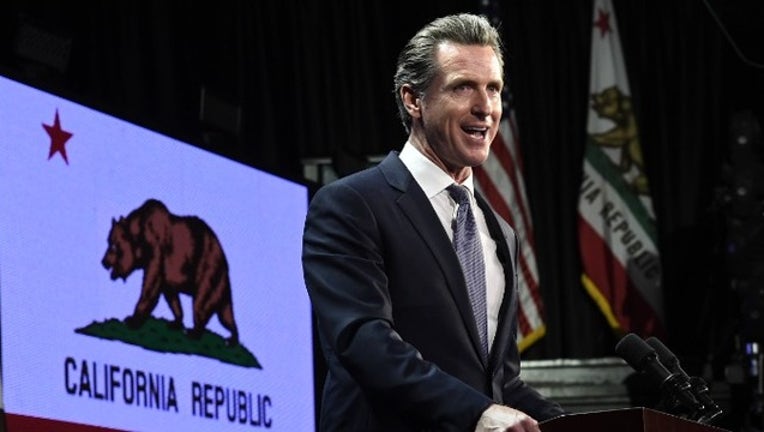California seeks to bring high-tech to state government

Gavin Newsom is preparing to take the reins from Jerry Brown. (Photo by Kevork Djansezian/Getty Images)
SACRAMENTO, Calif. (AP) - Gov. Gavin Newsom is looking for a leader interested in "breaking things, and making them better," who prioritizes "openness" and "simplicity" and can "feed and sustain team energy and enthusiasm."
"While you think long-term, your bias for action ensures you gain traction quickly," reads the job description for the head of California's new Office of Digital Innovation.
It sounds more like a job advertisement for a Silicon Valley startup than state government - and that's the point. Newsom wants the $26 million, 50-person office to throw away the old playbook and find ways to be more user-friendly for the state's 40 million residents when they do such things as seek benefits, start a business or renew a driver's license.
The California government has tried to infuse innovation before.
The state's technology department runs a digital innovation academy and an innovation lab, and it issued guidelines to make state websites more usable last year. The Government Operations Agency, which will oversee the new office, already has a director of innovation and accountability. The health and human services agency has its own innovation office.
"Only Sacramento can take innovation and make it more bureaucratic," said Assemblyman Vince Fong, R-Bakersfield, who noted problems persist with the state's technology, from the Department of Motor Vehicles to a new state accounting system.
Even the DMV, which has been plagued by hours-long lines and other hang ups, already has a Newsom-appointed "strike team" focused on improving its operations. The agency is closing its offices statewide for a half-day in July for employee training.
Members of the Newsom administration said the new office can bring a fresh perspective to state operations, ideally helping the state run more like a business. They want people to access state services with the ease of ordering a ride, a meal or nearly anything else with the tap of a smartphone.
"In your everyday life you have these great interactions with business," said Mike Wilkening, the governor's special adviser on innovation and digital services. "They make it as seamless as possible for you to conduct business with them - and the state does not."
While there's broad agreement that improvement is needed, some critics and supporters alike see potential for the new office to become just another layer of bureaucracy.
"It's going to be interesting to see how they organize those 50 people, how they ensure that they are not being redundant with what the other organizations are doing and how they integrate," said Teri Takai, a former chief information officer for California who now runs the Center for Digital Government, a 20-year-old national research and advisory organization for best practices in state and local government. She was an adviser to Newsom's transition team and advocated for the creation of the office.
She said other states are initiating similar efforts, though not all with a full department like California is doing. Alaska and New Jersey, for example, recently hired chief innovation officers.
Administration officials say the office would complement, not duplicate, existing state programs. An agency could, for example, bring a problem for the office to tackle, or the Newsom administration could request the office look into something specific.
"The governor would have no lack of ideas on ways we can improve services to Californians," said Brian Ferguson, a Newsom spokesman.
Once it comes up with an idea, the office would kick back some of the work of making it happen to the state agency that brought the problem or to the California Department of Technology if the solution is one that could improve service statewide, said Amy Tong, the state's chief information officer.
"It's complementary in the sense that the Department of Technology is still going to be very much focusing on statewide technology initiatives," Tong said. "Digital innovation would focus more on the front-end planning and discovery work."
Brian Metzker studied the proposal for the nonpartisan Legislative Analyst's Office and said the work the new office will do appears different from other state programs. But he noted its duties will evolve once a director is hired and the office gets up and running.
"It will be important for lawmakers to keep an eye on the office to make sure it's not offering competing or duplicative services as it gets to work," he said.
Fong, the Republican lawmaker, agreed government needs an overhaul, even as he questioned Newsom's approach.
"Tech has changed for the better everything in our daily lives, whether it's from travel, from booking services that we use in our daily lives or buying groceries," he said. But, "state government has lagged behind because all they do is create more red tape and bureaucracy."
Beyond the director, Newsom will appoint 19 other employees who will be exempt from civil service. Thirty others will be hired through the normal government process.
Of the new office's $26 million budget, $10 million would go into a fund it could tap to complete its work. The budget in following years would be $14 million.

